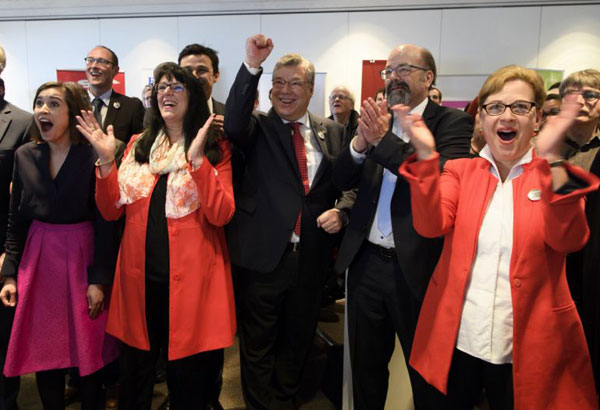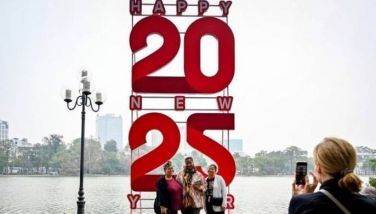Swiss voters reject plan to end mandatory TV fees

Laura Zimmermann, Operation Libero, National Councillor Marianne Streiff-Feller, National Councillor Matthias Aebischer, member of the Councillor of States Filippo Lombardi, Joachim Eder, member of the Councillor of States and National Councillor Edith Graf-Litscher, from left, react after the first projections concering the No Billag initiative, on Sunday, April 4. March 2018 in Bern. (Anthony Anex/Keystone via AP)
GENEVA — Swiss voters on yesterday handily rejected a proposal brought by free-market advocates to end mandatory fees to finance publicly supported TV and radio programming, a result that brought a sigh of relief to Europe's state-backed broadcasters.
Swiss broadcaster RTS — one of the stations that would have been affected — said a minimum number of Swiss cantons, or regions, turned down the "No Billag" referendum, spelling the end of the measure championed by far-right populists and named for the company that collects the TV and radio license fees.
RTS cited an early exit poll by the gfs.bern agency projecting 71 percent of Swiss voters had rejected the initiative, one of many held under Switzerland's distinct form of direct democracy.
A "yes" would have ended fees of about 450 francs ($480) per year levied on households. Large businesses also are required to pay.
The result is a blow for far-right populists who had sought an end to the fees, arguing that publicly supported broadcasters have an overly dominant position in Swiss media, and more competition was needed. They insisted the state-backed broadcasters should rely more on advertising, or levy charges for specific programs, movies and musical offerings.
Fee proponents countered that the Swiss should support domestic broadcasters and programming, particularly in a country with a high cost of living and four official languages — German, French, Italian and Romansh. They also worried that Swiss distinctiveness would be swallowed up by giving broadcasters in neighboring countries a big entrée into the Swiss market.
The vote was a particular threat for SRG SSR, the country's association of publicly supported broadcasters, which gets some 1.2 billion francs and 75 percent of its total budget from the licensing fees each year. The funds go to support nearly three-dozen regional TV and radio networks.
SRG SSR executives and their defenders painted a doomsday scenario of their broadcasters being forced to close, and mounted a powerful media blitz to reverse public opinion: Only a few months ago, polls suggested the measure would pass.
The head of German public broadcaster ZDF, Thomas Bellut, hailed the outcome, saying "the Swiss have sent a signal and made clear how important public broadcasters are for a pluralistic society."
In Germany, where households are generally required to pay 210 euros ($260) a year, the right-wing Alternative for Germany party has campaigned to abolish the fee, while accusing public broadcasters of being overfunded and spreading government propaganda.
Outside a Geneva polling station, voter Stephen Perrig, a 55-year-old neurologist, said paying fees for good programming was "like in health: If you want quality, you have to pay."
But retiree Regina Voelker voted against the fees, saying the Swiss could seek programming alternatives elsewhere.
- Latest
- Trending
































